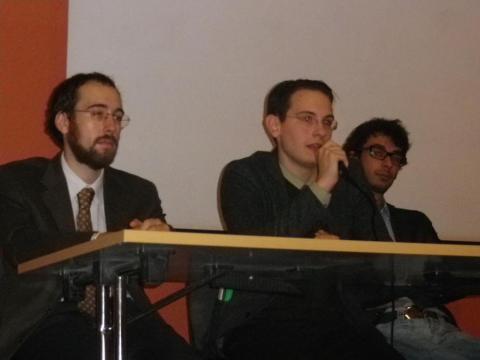Over the Atlantic and Eurasia: Europe
Primary tabs

Over the Atlantic and Eurasia: Europe
In the last spasms of the unipolar system that shook the world, stirring the global geopolitics, emerges ever more clearly the underground and never faded conflict between telluric forces and oceanic power. In the context of the international relations, the rising conflict between the East and the Far West of the world increasingly becomes acute, while in the macrocontinental space nations and countries rediscover their own imperial natural vocation, extending their influence for the creation of specific major regional areas, to achieve greater stability and definitely afford to reappear again in the stage of international politics, coming up again even as pawns of the great global chessboard.
In this perspective, the Russian Federation proposes the economic and strategic integration of the Eurasian region (identified in the Central Asia by the theorists of eurasiatism and neo-eurasiatism) accompanied by a containment of the phenomenon of independence, Turkey returns to a neo-ottoman policy, favored by Erdogan’s presidency, factually denying the political influence that the Young Turk revolution has had on it for over a century and coming into conflict with the pan-arab interests (in this sense, the strategy of support of the Saudi and western destabilization of the Syrian government is evident), China extends his influence ever more relentlessly on the South China Sea, healing the open wound with Taiwan through a smooth integration in their areas of influence and trade, but conflict with the interests of Vietnam and Philippines which, sniffing the Chinese grand strategy, oppose to it an incoming national pride; for Europe, however, seems to be missing the big picture. There is no ability, apparently, to plan a necessary policy to achieve its interests on the globe, which means, on the other hand, to assert and preserve their world view, a millennial cultural heritage, in continuous relation with the Asian, African and Arab (and frequently not sharply distinguished from them), has always be a beacon of civilization for the Peoples.
Europe, for centuries, has manifested itself as the heir of the philosophical and spatial conception of the East of the world. From the East arose the deep foundations of human culture, there also arose the conception of the telluric space, the metaphysical roots of religious thoughts, also Christian Revelation had historical manifestation at east respect Europe.
Ex Oriente Lux.
Europe, emerging in the forge of civilization of the Roman Empire, built with the cathedrals and the political form of the Holy Roman Empire, has become the largest temporal manifestation of the eternal spiritual principles. In it, the systematization of the philosophy and metaphysical thought, theology and law, conspired to create a political structure where the principle of representation and the society teleological oriented to the Transcendent did not prevent the individual achievement, but preferring to it the objective higher values, the organic order, the human community.
Europe, traditionally understood, is not identified with the West, it does not place itself in the East-West dichotomy, does not foresee a clash of civilizations: it, home of the Roman universalism, reaping the legacy of encounter of the Mare Nostrum, the Mediterranean, is the place where the Civilization resides and flourishes.
The West, as a cultural category born during the spiritual decadence of the Renaissance and developed with the Enlightenment, is the antithesis of the Europe as well as for the East.
If Europe is not merely a telluric force, if it is Coastland between Heartland (Vostok – the rise of the Civilization) and the oceanic power (Leviathan – aversion to the political principle, the postmodern drift of the denial of metaphysic, and with this, of a universal and eternal order of values), then it symbolizes, more than ever, human free will, the sovereign capacity of man to choose his own destiny, between denying his own nature and turn his backs on his realization, and impose his implementation against the historical “evolution” and entropy, stating the Being and standing up in defense of metaphysical truth, adhering to a greater reality that includes and sublimes his will.
But Europe seems to have lost the battle that the times require it, seems to have been sacrificed on the altar of the history to the interests of the Far West. It has precipitated unbridled in the abyss of the undecisionism, sloth makes it prey to foreign strategic interests.
Yet, while it is the scene of the suicide of its political class and the spontaneous suppression of his interests, allowing himself without any hesitation to the historical decline, East and West rise again to engage themselves in the open field of the global strategic opposition – a phenomenon never more obvious than from the time of the bipolar opposition – as primordial principles of Earth and Sea, political and economism, Rise and Decline.
In this scenario, Europe cannot escape: she, the center of the world, also represent the cornerstone of historical outcomes. The choice that is imposed is not a purely strategic issue, but in this sense becomes the identification of her tragic fate. She is located in front of the epochal turning point: accepting her own nature and historical identity, turning back to an understanding whit the East that safeguards herself and her interests, primarily political, or treat herself finally to the decline, go down, give up her last chance to rise again on the world, defining her total annulment against the principles that she has always established.
This is the historical contingence in which it is definitely necessary to formulate a purely European political paradigm, which integrates the elements that have made great Europe over the centuries with a distinct geopolitical strategy aimed at safeguarding and redefinition of its role to the multipolar order.
If the Sun rises in the East, it shone at the zenith on Europe.
